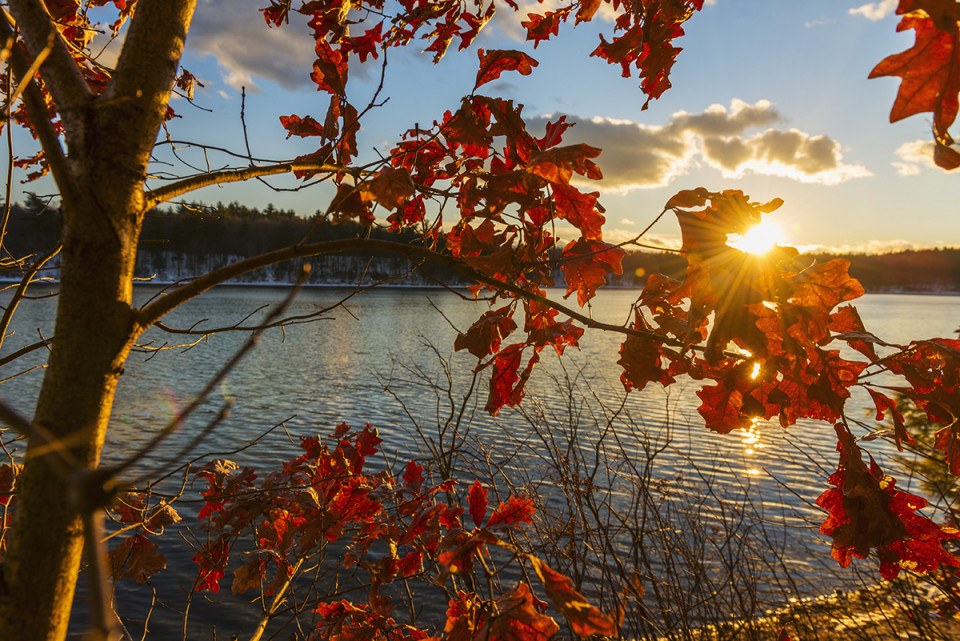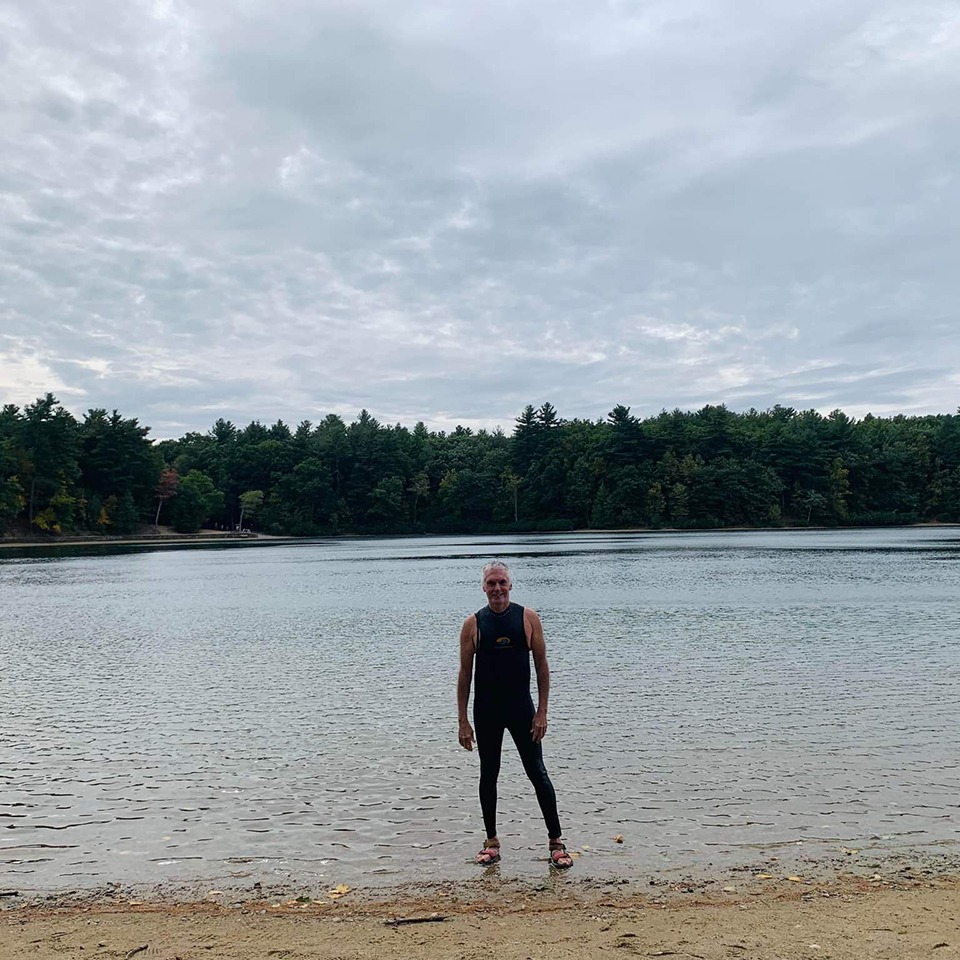The Cold Truth: Swimming Walden Pond in November
On a cool morning in Concord this fall, I found out what it’s like to follow in Henry David Thoreau’s footsteps.

Walden Pond in autumn. / Tetra Images via Getty Images
I arrived at Walden Pond State Reservation just after sunrise, recalling that a certain local resident named Thoreau once wrote, “Morning brings back the heroic ages.” Only a few cars were scattered across the lot—funky foreign rust buckets adorned with yoga stickers, and, in one case, a little plastic hula girl perched on the dashboard. A thermometer attached to one of the outbuildings marked the temperature at 45 degrees.
Beside a dented Toyota, a lean man with a wetsuit rolled down to his waist was performing a handstand, his body straight and still, feet pointed at the lightening sky. On this brisk November morning, it seemed I’d entered a territory of cosmic distinction, where the iron will of the endurance athlete merged with Thoreau-like contemplation.
Just off Route 2 in Concord, 18 miles west of Boston, Walden Pond’s public beach, walking trails, and facsimile of Thoreau’s cabin are thronged with visitors in the summer. But when the calendar—and the weather—turns colder in late autumn, the 462-acre state park is nearly deserted. Early in the morning, the half-mile expanse of Henry David Thoreau’s famous watering hole is an appropriate spot for open-water swimming, and open-minded thinking. It’s one of the great American landscapes, and it must be experienced first-hand, on foot and on the water, not from a passing car or the screen of a smartphone.
On this first American frontier, Thoreau discovered a profound connection between the history of the Old World and the wilderness of the new one. His wanderings in Concord and in the Maine woods established the basic tenets of environmentalism, gave proper context to the legacy of Native Americans, and helped forge the northeastern approach to revering and protecting the land.
But the author wasn’t always as revered as he is today. Treated as a pariah by his fellow villagers, Thoreau went to the pond to “transact some private business with the fewest obstacles,” willing himself to create a masterpiece. After his first book, A Week on the Concord and Merrimack Rivers, failed to garner any notice, Thoreau embraced what must have seemed like an impossible challenge—a deeply learned, philosophical tale about his experiences on Walden Pond, as well as his own place in the American landscape.
Thoreau’s new project, originally entitled Walden; or Life in the Woods, also dealt with his neighbors’ assumption that he lacked ambition. Yet somehow, he produced one of the most profound works of art in American history. Thoreau was, among other things, a very persistent fellow, which is a quality I can relate to.
Thoreau was also known for his thrift, and I’d followed his example by having a raw-food energy bar for breakfast and borrowing a state parking pass from my hometown library, saving myself $8. Crossing Walden Street with my swim gear, I was serenaded by twittering birds and a lone insomniac cricket. From the height of the land I could see the pond, irregularly shaped, pushed down into the surrounding countryside like a coin. The sun was rising over the dark wall of trees, and at the far end of the beach, past the shuttered pavilion and empty lifeguard stand, the last blush of autumn was painted across the oaks and maples.
This was an excursion into history, the sacred waters of an American genius. On mornings like this, with no townspeople in sight, Thoreau would take his long, ruminative walks along the shoreline. He considered himself a “saunterer,” derived from the Latin sans terre, without land or home, therefore at home everywhere. That morning, I felt the same way, completely footloose and without any ties. Around me in the woods, I could hear the scratching and shuffling of tiny animals. It reminded me that Thoreau wished to make a flying squirrel his pet, because he thought a poet’s “cat” should be winged, as well as his horse.
A pair of flip-flops and two or three mesh swim bags were lined up on the low stone wall bordering the strand. I could make out the heads of three swimmers stroking their way toward the far bank. There was no one else around.

The author at Walden. / Photo courtesy of Jay Atkinson.
Stripping down to my trunks, I tugged on a sleeveless wetsuit, strapped on goggles, and zeroed out the timer on my watch. Spires of mist rose from the pond, which was flat and black and still. Old Testament clouds were looming, with only a few patches of blue to the east. Tiny water bugs skimmed over the surface, impressing their zigzag patterns on the water. A few drops of rain freckled the pond, sending out five or six concentric circles before disappearing.
Wading into the clear, pebbly shallows, I said a quick prayer and made the sign of the Cross as I lowered my goggles and set off. The water was significantly colder than the air, and all I could hear was the wild echo of my own breathing.
Thoreau wrote, “Time is but the stream I go a-fishing in.” On the pond the sharp intake of my breath echoed across my mind with every pull, while each head-tilt produced a snapshot of the ascending sun, caught in the space between the gathering clouds and the serrated row of fir trees. Thoreau noted that Concordians once thought the pond was bottomless, and staring into the milky-green depths I understood why. A so-called kettle hole formed by a melting glacier, Walden Pond is 61 acres in total area and 102 feet deep.
After a few minutes, the layer of water between the wetsuit and my skin warmed up, insulating me from the cold, and I marveled at the slanted sun reflecting off the pond onto the trees. After listening to Neil Young on my way to the pond, I could hear “Hey Hey My My (Out of the Blue)” playing in my head, synchronized with this celestial light show.
Fifteen minutes into the swim, I popped up to get my bearings. Coming the other way, another swimmer must’ve been thinking the same thing, because suddenly we were facing each other, just a few feet apart and 400 yards from shore, blinking through our goggles. It was like running into your neighbor on another planet.
“Good morning,” he said, and I responded in kind, feeling like Thoreau did when he ran into his fellow eccentric, Bronson Alcott.
Then I was off again. Counting my strokes induced a trance-like state, helping me overcome the weariness that sets in during long, cold swims. I lost track somewhere around 600 and went streaming onward, my breath coming in just the right rhythm so I didn’t feel tired, only exhilarated.
Over the first thousand yards, a fragment of Thoreau’s verse came to me:
What is it, what is it,
But a direction out there,
And the bare possibility
Of going somewhere?
At one point it seemed as though I’d risen above my swimming self and was looking down on a pair of churning legs and the thin white trail flowing out behind. If Thoreau’s rendition of the landscape was America writ large, by swimming across Walden, I was adding my own footnotes to the American story, scribbling them across the frothy surface of the pond.
In 1845, Thoreau built his tiny cabin on a bluff overlooking Walden Pond, where he grew a garden, worked sporadically as a hired man, and announced his intention to “live so sturdily and Spartan-like as to put to rout all that was not life.” After 25 minutes, I arrived at Thoreau’s Cove, a shallow inlet close to where he lived for two years and two months. Reaching that end of the pond, I stood in the waist-deep water looking up at the cairn that marks the site, and a red maple leaf floated past, a symbol of the Canadian weather that would soon be coming our way. I snatched it up and stowed it under the chest plate of my wetsuit and resumed swimming.
Nothing lasts—especially not a New England autumn—and I wanted to wring every stroke, every breath, every passing thought and sensation from the sanctifying waters of the pond.
Jay Atkinson has published nine books, including The Tree Stand, which is excerpted here. He teaches writing at Boston University.


